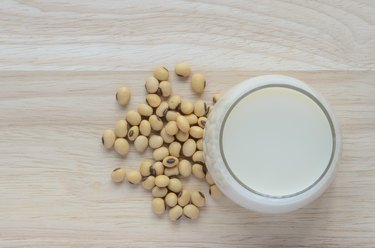
Although there are numerous claims of a relationship between lecithin and weight loss, scientific proof is sparse. To date, the best research on using lecithin for weight loss is actually on choline, which makes up 3 to 4 percent of soy lecithin.
Tip
Although scientific evidence is sparse, some studies do suggest a link between lecithin and weight loss — perhaps, at least in part, due to lecithin's choline content.
Video of the Day
Lecithin and Weight Loss
As the University of Rochester explains, lecithin isn't a single chemical, but instead a group of related chemicals that fall within the group known as phospholipids. These chemicals are essential components in numerous tissues throughout your body including your brain, blood, nervous system and cell membranes. Once you ingest lecithin, it turns into choline, which has been fairly well studied for a variety of benefits.
Video of the Day
Taking supplements isn't the only way to increase your intake of lecithin. Foods such as egg yolks, soybeans, wheat germ, peanuts and liver are also good sources of lecithin. There are no studies specifically addressing lecithin supplement use and weight loss. However, there is a growing body of clinical research regarding the use of choline — a primary component of lecithin — for weight loss.
For example, in a small study published in the March 2014 issue of the Journal of Human Kinetics, researchers evaluated 22 female taekwondo and judo athletes. Half the subjects took choline tablets for one week before competition. Despite the short time frame, the subjects taking choline showed notably reduced body mass after the competition.
Other Benefits of Lecithin
The University of Rochester notes that lecithin may also be used to treat gallbladder disease, as well as fatty liver in people who are on long-term parenteral, aka intravenous, nutrition. However, they also caution that lecithin's role in these treatments is not well defined or confirmed.
According to a small study published in a 2018 issue of Nutrition Journal, lecithin might possibly provide some relief from fatigue and menopausal symptoms, although it's not clear how (or if) this benefit extends to the general population.
The randomized, double-blind, placebo-controlled study included 96 women between the ages of 40 and 60 who complained of fatigue; ultimately, the researchers concluded that a 1,200-milligram "high" dose of soy lecithin both increased vigor and lowered diastolic blood pressure in the study participants.
Some potential benefits of taking a lecithin supplement derive from its choline content. As Harvard Health Publishing notes, soy lecithin is between 3 and 4 percent choline. They go on to note that people whose diets are rich in choline are more likely to perform well in tests of memory and cognitive ability, and that high levels of choline consumption are also associated with healthier brain tissue.
The standard choline dose is 250 milligrams, which you could consume by taking 750 milligrams to 1 gram of lecithin.
Finally, a data review published in a 2012 issue of Lipids in Health and Disease notes the wide range of possible benefits from dietary phospholipid intake, which includes lecithin. Just a few of the benefits associated with therapeutic dietary phospholipid intake include positive effects on inflammatory processes, reduced drug interactions, lower total cholesterol, and protection against neurological disorders.
Read more: 12 Foods With Surprising Health Benefits
Lecithin Dosage and Side Effects
As the University of Rochester notes, there is no recommended intake amount for lecithin, and overdose effects are not known. They also warn of potential side effects from lecithin — including stomachache, diarrhea and loose stools — and advise that pregnant or breastfeeding women should talk to a healthcare provider before taking lecithin supplements.
If you're taking lecithin for its choline content, a Harvard Health Publishing note that the safe upper limit for choline consumption is 3,500 milligrams per day may be helpful — but this would require ingesting enormous amounts of lecithin.
That's not advisable without medical guidance, because any supplement can be produce adverse effects if taken in sufficient quantity. As the U.S. National Library of Medicine points out, you can even overdose on multivitamins.
- Harvard Health Publishing: "A Possible Brain Food You've Probably Never Heard Of"
- University of Rochester: "Lecithin"
- U.S. National Library of Medicine: "Multiple Vitamin Overdose"
- Journal of Human Kinetics: "Effect of Choline Supplementation on Rapid Weight Loss and Biochemical Variables Among Female Taekwondo and Judo Athletes"
- Nutrition Journal: "Effect of Soy Lecithin on Fatigue and Menopausal Symptoms in Middle-Aged Women"
- Lipids in Health and Disease: "Health Effects of Dietary Phospholipids"